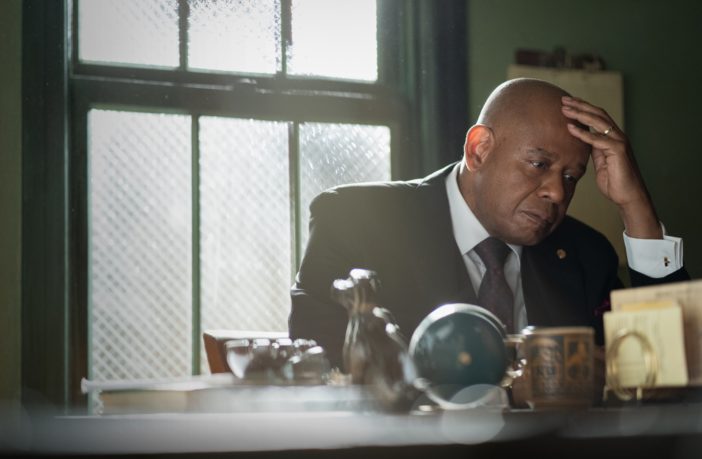“I wasn’t interested in playing Bumpy at first,” admits Forest Whitaker. As he and his team continued to develop Godfather of Harlem, his mind began to change. “I thought it was exciting to get a chance to see Bumpy Johnson interface with the civil rights movement, the politics of the day…to be able to tell stories I thought were going to be reflective of some of the things happening today, so I just decided to give it a shot.”
Set in the 1960s, Godfather of Harlem is not the gangster series most expect to see. Instead, it’s extremely layered, exploring the issues of the day, with a heavy focus on how the entrenched racism and prejudice Black people faced manifested itself then. What makes the show effective, however, is it shows Black people as people, with lots of specific, well-researched details. It centers around Bumpy’s return to Harlem in the early 1960s after spending a decade incarcerated at storied Alcatraz and the challenges he faces as he tries to rebuild his criminal enterprise, the only life he had really known. Crime, as the series shows, was even less easy then.
Since its premiere in 2019, Godfather of Harlem has shown Bumpy’s difficult dealings with the Italian mafia and their racism, as well as operating a criminal enterprise. But the series also highlights Bumpy’s relationships with historical figures Malcolm X and Congressman Adam Clayton Powell, Jr. as well as those with his wife Mayme, daughter Elise (a recovered drug addict who joined the Nation of Islam), his daughter/biological granddaughter Margaret and with his crew. What emerges is an extremely complex portrait of Bumpy that is neither all good nor all bad.
Season three, now on MGM+, formerly EPIX, continues Bumpy’s struggle. “I am still in the position of rebuilding because when you meet me—it’s after the riots, after all my dope has been burned up, and I’m kind of out on my own,” Whitaker says of character Bumpy. “You get to see a lot of the characters this season having to expand their worlds. Bumpy tries to negotiate with the five families and they won’t go for it. So he ends up becoming a partner with the Cuban mafia. And that brings into his life the CIA and the FBI.
“He’s trying to make things better at home. His wife Mayme is really strong, so she’s been really pushing [Bumpy] out of the drug business and into different businesses. So we get a chance to see a change [there],” he continues. “This time too we get a chance to see Malcolm [now played by Jason Alan Carvell instead of Nigél Thatch]transform as he goes to Mecca and starts to see that Islam is practiced by different cultures and different races. [Throughout the whole season] a lot of new discoveries are being born, new leaders [emerge]. It starts to explore what it is you [really]need to have in your life and how you need to depend on others to be able to do it.”
“[The show] was never intended to be just a gangster series. It was supposed to also reflect on family and choices,” the Oscar winner explains. “It feels like Bumpy has all the potential in the world but is being denied [opportunities to realize it]and ultimately takes it because of who he is, the kind of leader that he is. This [series]talks about the opportunities that we have and have not and what this one man did to achieve them and really looks at if it’s ethically right.”
While some rumors swirled that this third season would be its final, Whitaker says “I think we’re going to have another season.” Perhaps what sets Godfather of Harlem apart is the collective responsibility they feel to honoring the history. “Everybody’s really trying hard to do something great,” he adds.
That means staying “true to the time, to what was being done by these individuals because they are real [people]….We get to see Harlem for its glory and then in some of its dark areas too.”
In addition to Giancarlo Esposito playing Adam Clayton Powell whom he says “does an amazing job,” Whitaker also heaps praise on actresses Ilfenesh Hadera and Antoinette Crowe-Legacy who play his wife Mayme and daughter Elise. “Antoinette as Bumpy’s daughter, she’s an amazing actress, and Ilfenesh plays a really powerful woman and I think that the depth of their characters is going to be really strongly reflected as the show continues to grow.” Another bright spot is Whoopi Goldberg’s return as Miss Willa for season three. “I love working with her,” Whitaker smiles. “We do quite a few scenes together this season. She’s amazing.”
Whitaker also feels season three can resonate with us now, in today’s world. “The main question Bumpy’s going through is having a moral center and doing that thing that’s right for the community and the people and asking when is right right and wrong wrong or are we always right, wrong, right, wrong?
“People can look at their own lives as well and also recognize that they have the power too to make change because those changes are happening inside the show, on the criminal front and also the political front and the civil rights front,” continues Whitaker. “That’s what’s happening in our country right now. So a lot of different things are changing but people have to know that they can step up and empower themselves to make a change.”
Godfather of Harlem airs Sunday nights on MGM+.



